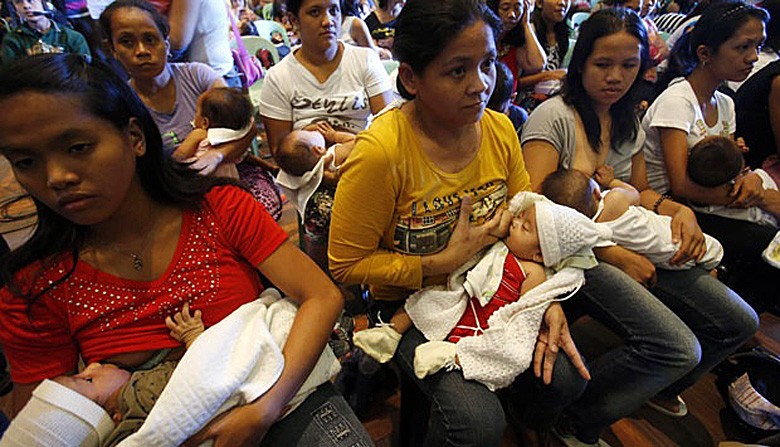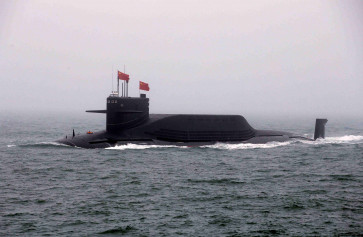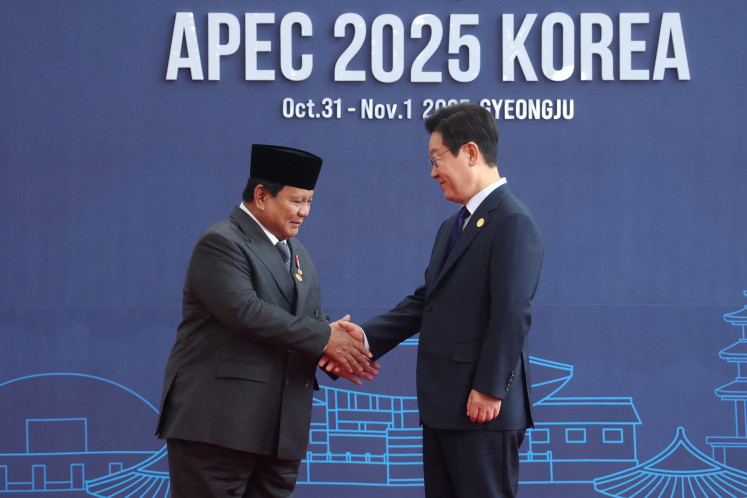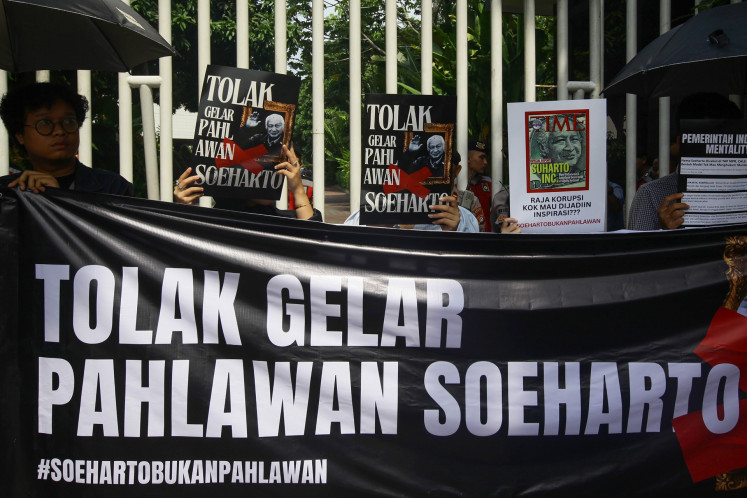Popular Reads
Top Results
Can't find what you're looking for?
View all search resultsPopular Reads
Top Results
Can't find what you're looking for?
View all search resultsDemarketing infant formula
Unfortunately, Indonesia is one of infant formula industry’s biggest target markets. According to Dylan Walters, a health researcher with Canada’s University of Toronto, and several others who together published an article entitled “The cost of not breastfeeding in Southeast Asia” in the July 2016 issue of Health Policy and Planning, in 2014 the value of annual formula milk sales nationally for children under the age of 3 was estimated to be US$2.4 billion. Infant formula marketing in Indonesia is considered aggressive, inappropriate and some say unethical.
Change text size
Gift Premium Articles
to Anyone
T
his week, from Aug. 1 to 7, advocates of breast-feeding celebrate the annual World Breastfeeding Week. Globally, this year’s theme is “How to value our well-being from the start of life”.
Breast-feeding is a key element toward the 17 global Sustainable Development Goals. Let’s just focus on the goals of reducing poverty and ensuring sustainable consumption and production, as they both relate to the urgent need of “demarketing” infant formula.
First, breast-feeding contributes to poverty reduction because it is a natural behavior and a way of feeding infants that is affordable for everyone compared to infant formula feeding. Infant formula is expensive, including the cost of utensils and sterilizing them. As formula-fed babies have been found to become sick more often than breast-fed ones, families also have to spend more for health care.
Second, sustainable development is essentially also about ecology. Optimal breast-feeding requires less energy compared to infant formula feeding, which is produced by factories. Unlike infant formula, breast milk feeding needs no water, bottle sterilization equipment, or fuel, and is thus ecofriendly. When a baby reaches 6 months, locally nutritious available and affordable foods should complement breast milk until the baby is 2 years or older.
If local foods will no longer sustain nationwide needs, families have to buy processed baby food products from the market.
Unfortunately, Indonesia is one of infant formula industry’s biggest target markets. According to Dylan Walters, a health researcher with Canada’s University of Toronto, and several others who together published an article entitled “The cost of not breastfeeding in Southeast Asia” in the July 2016 issue of Health Policy and Planning, in 2014 the value of annual formula milk sales nationally for children under the age of 3 was estimated to be US$2.4 billion. Infant formula marketing in Indonesia is considered aggressive, inappropriate and some say unethical.
Here, marketing means going beyond advertising. Judith Richer, a sociologist and breast-feeding advocate, defined marketing as a strategic activity and a discipline focused on getting more consumers to buy certain products more often to make more money. Thus, any infant nutrition program supported by the baby food industry or its affiliates could be included in this definition.
Nationally, it is not hard to name nutrition programs supported by transnational baby food corporations — not to mention posters, baby/mother-name bracelets, hospital discharge packages for mothers and much more. A recent study in six provinces across Java also found that 72 percent of mothers confirmed that they saw formula milk promotional materials both inside and outside health facilities. Moreover, some mothers have reported receiving advice and information from health professionals to use infant formula to substitute for breast milk.
Notwithstanding breast-feeding promotion and other infant nutrition programs to prevent babies and mothers from facing health risks, national breast-feeding rates remain low at 42 percent.
Thus, it is now perhaps the time to demarket infant formula in Indonesia. One of the rationales is the potential health risks caused by infant formula feeding, particularly regarding misuse. For instance, when no safe and clean water is available or when those in charge of the infant fail to comply with instructions on mixing the powder and water, the infant is exposed to various illnesses.
Numerous studies find that artificial feedings, including with infant formula, contribute to the underlying causes of death among infants, such as diarrhea, pneumonia, acute ear infection, respiratory infections, gastrointestinal, obesity, asthma and type 2 diabetes. Worldwide, poor breast-feeding practices, including the use of infant formula, contribute to more than 800,000 deaths in children under the age of 5 annually.
The transnational baby food corporations do not need to fear bankruptcy because they can still produce infant formula in adequate amounts to meet the needs of those who are medically indicated as unable to breast-feed.
The notion of demarketing aims to reduce or stop completely efforts to sell a particular product because of health risks to users. Demarketing has been commonly used to reduce the consumption of tobacco, drugs, sugar and other products that pose health risks.
Another important driver to demarket infant formula nationally is perhaps the recommendation from the latest World Health Assembly, its 69th assembly in May, which Health Minister Nila Moeloek attended. It recommended ending inappropriate marketing of foods for infants, including formula products for zero to 3 year olds. The recommendation clearly aims at protecting, promoting and supporting breast-feeding.
Thus the government should follow up the commitment to scale down the marketing of any formula such as “follow-up formula” and “growing-up milk” targeted for consumption by infants (zero to 6 months) and young children aged 6 months to 3 years.
***
The writer is an Indonesian government LPDP scholarship student pursuing a doctoral program at the Health and Behavior Studies Department of Teachers College, Columbia University, in New York, US.
---------------
We are looking for information, opinions, and in-depth analysis from experts or scholars in a variety of fields. We choose articles based on facts or opinions about general news, as well as quality analysis and commentary about Indonesia or international events. Send your piece to community@jakpost.com. For more information click here.










